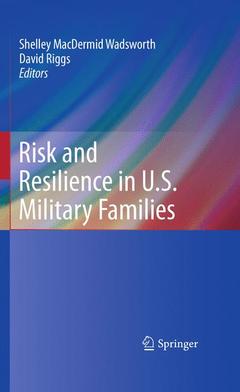Description
Risk and Resilience in U.S. Military Families, 2011
Coordinators: MacDermid-Wadsworth Shelley, Riggs David
Language: English
Subjects for Risk and Resilience in U.S. Military Families:
Publication date: 10-2012
369 p. · 15.5x23.5 cm · Paperback
Publication date: 11-2010
369 p. · 15.5x23.5 cm · Hardback
Description
/li>Contents
/li>Biography
/li>Comment
/li>
Dr. Shelley MacDermid Wadsworth is a professor of Child Development and Family Studies. She serves as director of the Center for Families at Purdue University, as well as director of the Military Family Research Institute. The primary focus of Professor MacDermid's research is the connection between work conditions and family life. She is particularly interested in links among work-family tension, marriage, and parenting, and she has studied workplaces as contexts for adult development. Her research has been published in several journals, including Journal of Marriage and the Family; Journal of Family Issues; and, Family Relations. She has received research funds from the Alfred P. Sloan Foundation, the Cooperative Extension Service, and the State of Indiana. In 1996, Professor MacDermid became the director of The Center for Families at Purdue University. Through the Center, she founded and now directs a membership organization focusing on family issues for employers in the Midwestern region. She has served as co-director of Military Families Research Institute since 1999. Professor MacDermid is the author of more than 90 invited or refereed research articles, chapters, books, and scientific presentations. Her research has won one national award, and she recently received the Award of Merit from the local chapter of Gamma Sigma Delta. Professor MacDermid has been an associate editor of two scientific journals, a member of the editorial boards for two others, and a reviewer for three additional publications. She also has reviewed for the National Science Foundation, the Social Sciences & Humanities Research Council of Canada, and the Royal Society of New Zealand Centres of Research Excellence Fund.
David S. Riggs, Ph.D. is the Executive Director of the Center for Deployment Psychology. Dr. Riggs received his B.A. from the University of Kansas and earned his Ph.D. at the State University of New York at Stony Brook in 1990 after completing a clinical psyc
Presents new data and new analyses of the research on military families
Offers interdisciplinary perspective from military to mental health
Contributors are leading researchers in the field
Offers a mix of research and intervention
Includes supplementary material: sn.pub/extras




